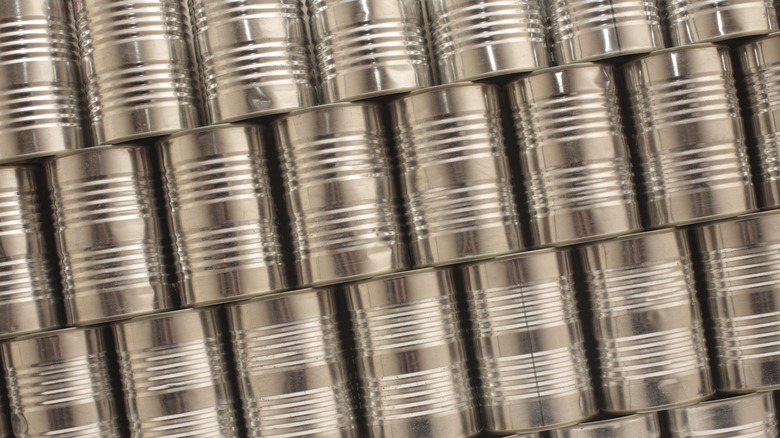Is It Ever Safe To Eat Bulging Canned Food?
When you reach into the back of the pantry, you may find some long-forgotten canned foods. It can be tempting to use those cans up before their expiration dates — until you notice some imperfections marring the can. But is it safe to eat the food inside, even if the can looks misshapen? Unfortunately, some dangerous contents could be lurking inside those cans, so you should take caution.
If food is improperly canned, it could develop botulism. The very toxic bacteria causes severe illness, and the inside of a can could be the ideal environment for botulism to develop, according to State Food Safety. Of course, the safest way to avoid botulism is to simply toss out any imperfect cans of food. (And there are some canned foods you should avoid altogether.)
But what about those dented cans on the clearance shelf at the grocery store? Could botulism be hiding inside? In general, heavily dented cans, cans that swell, and cans that leak should all be thrown out. Swelling and bulging cans could be a sign that the bacteria behind botulism is growing inside and that the food has spoiled.
Ultimately, although it may be disappointing to have to toss out your canned foods, it's better to be safe than sorry. Some smaller dents may be okay, but caution should always be used to prevent any risk of botulism infections — and bulging cans should always be avoided.
Bulging cans could be a sign of bacteria
If the cans are misshapen and bulging — like they've been inflated — or the cans are leaking food, this is also a clear sign that the food is unsafe to eat. Bulging or leaking cans are generally the result of unsafe storage, spoiled food, or having been frozen, per the FDA, and can be a breeding ground for bacteria. You should be especially cautious to avoid mistakes when canning at home.
In general, cans with tiny dents (like the ones found on clearance cans at the store, or the ones caused by dropping the can in your own kitchen) are likely safe to open and eat. The University of Wyoming advises that these little dents are often harmless, so long as the can's seal hasn't been broken, and the food inside hasn't been impacted by exterior elements.
However, larger dents could be hiding cracks in the can, particularly if they have any sharp edges. These dents are likely to have broken the can's seal. Additionally, any dents along the rim of the can (even tiny ones) can break the seal and should be discarded, as well (even if the break isn't obviously visible).
Botulism can have dangerous outcomes
Foods containing the botulism toxin won't taste, smell, or look any different from safe foods, according to the CDC, making it even more dangerous. When ingested, the bacteria creates a toxin that can damage the body's nerves and leave long-term lasting damage in some, and even death.
Symptoms of botulism can include muscle weakness, slurred speech, nausea, and in the most severe cases, the illness can lead to death — even if only small doses were ingested. Any suspected cases of botulism should be immediately addressed by a medical professional, and inspecting cans carefully is an important part of avoiding any risk of infection in the first place.
If you're trying to use up those long-forgotten cans stuffed in the back of the pantry, pay close attention to the expiration date and the appearance of the can itself before reaching for the can opener. (Did you know that some canned goods can even break down the cans themselves?) While tiny dents in an intact can could be safe to ignore, so long as they're away from the can's rim, any larger dents, leaks, or cracks are clear signs that the cans should be tossed out.


